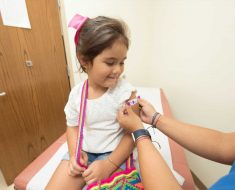SAN FRANCISCO — This past year, Google found itself in the spotlight of a nationwide debate on health data privacy when a Wall Street Journal scoop brought to light its data sharing deal with Ascension Health. Subsequent reporting, however, confirmed that Google had done nothing wrong legally, even as conversations about the ethics of this kind of data sharing continue.
At the Startup Health Festival on the outskirts of the JP Morgan Healthcare Conference here this week, Google Health VP Dr. David Feinberg opened up to Startup Health CMO Dr. Howard Krein about the debacle, speaking candidly about the company’s dealings with Ascension, as well as his disappointment with the media’s handling of the news.
“The press has made this into something that it’s not,” Feinberg said. “This is not us mining somebody’s records to sell ads, to learn from it, to do machine learning, to develop products. We developed this on de-identified data. We brought this to Ascension. We’re piloting with them.
“Every doctor that is using it, of course, is aware because they see a Google search bar on their patient’s record,” he added. “It wasn’t in secret. And so we’re actually really, really proud of the work. And we hope that we can demonstrate a real improvement in care, less physician burnout and more joy into taking care of people.”
Specifically, Feinberg said, Google is working with Ascension in several ways, which have sometimes been conflated in the reporting that was done. Two are straightforward and don’t involve Google seeing any data: Ascension uses Google’s cloud services and some G-suite tools.
“And then they asked us, in two hospitals, to do something special,” Feinberg said. “Two hospitals, not three quarters of the United States like the Wall Street Journal said. In two hospitals they said, ‘Could you help us organize that health record?’”
“I think that very often fear is used to sort of quell innovation — ‘Oh, people are going to have access to your records, nothing is going to be secure’ — and then that creates this fear, but it really is more hurtful to innovation than it is helpful to secure data.”
Dr. David Feinberg, Google Health
For Google, it’s a low-hanging fruit project because search is at the heart of the tech company’s core competency – but search in healthcare is behind the times.
“As a practicing clinician, if you go into these health systems, it’s like finding a needle in a haystack to try to find a piece of information,” he said. “And you really have a view just for Epic or Cerner. You don’t necessarily have a view on that patient for the other parts of their record that aren’t in the Epic and Cerner. So we brought in the Google technology for search and created a unified platform for doctors and nurses at two hospitals to search their patients’ individual records.”
For that functionality, Feinberg admitted, Google employees did need access to some patient data. But he maintains that they managed that access in a legal, responsible way.
“It’s a business associates agreement,” he said. “Ascension has 600 business associates agreements. When you go to any doctor’s office, any hospital, they give you a privacy form that says we’re gonna keep your information private, but we have third parties that we’ve worked with, like Epic, Cerner, a lab or maybe Mayo Clinic specialty diagnostics, life insurance companies, billing companies that are going to have to see part of your record to do what we’ve asked them to do. We had been asked and the only thing we did was organize the record. We just put it in a way that it was searchable. That’s all we did.”
Managing public expectations
Google and Ascension’s partnership, and the reaction to it, has highlighted a knowledge disconnect between the industry and the public around what HIPAA does and doesn’t do. But Feinberg thinks the sort of reaction that transpired represents a risk to health tech reform.
“I think that very often fear is used to sort of quell innovation – ‘Oh, people are going to have access to your records, nothing is going to be secure’ – and then that creates this fear, but it really is more hurtful to innovation than it is helpful to secure data,” he said.
Much of the criticism in the WSJ piece and subsequently focused on the fact that patients weren’t informed that Google would have access to their data. This is true, Feinberg said, but not really remarkable.
“Nobody goes over all 600 business associates agreements,” he said. “But we keep thinking about this one, how we can get more agency there and more understanding there. We do appreciate that we’re in a somewhat unique position in that we’re also a consumer company and there’s there’s worry that we’re combining stuff. We’re not combining stuff, but to build that trust I think we really have to think about ways we can give people agency to understand what’s going on in this particular instance where we may be exposed to private health information.”
Feinberg didn’t spend his whole time on stage talking about search and Ascension. He highlighted additional work Google is doing around diabetic retinopathy screening in India and Thailand and some promising work the company has done applying AI to mammography and kidney screening. But none of that good work can reach its full potential without bridging the trust gap brought to light by the reaction to the Ascension partnership.
“If you don’t trust us and we can’t bring [innovation] in a way that actually makes it easier, that’s comprehensible, that’s affordable, that’s dignified, that’s culturally sensitive — if we can’t make it the way that I would care for my own family – then I don’t care how good the AI is. It’s not going to work. So we’re really, really focused on understanding what people need, especially on the consumer side and the deep, deep relationships on the provider side.
“It would be a shame on us if we can’t get this technology into the real world because we don’t act in a humble way, we don’t act in a thoughtful way, and we don’t appreciate how hard it is to be a caregiver,” he said.
Jonah Comstock is Director of Content Development for HIMSS Media.
Email: [email protected]
Twitter: @JonahComstock
Source: Read Full Article






